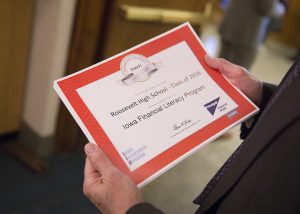DMPS Financial Literacy is Moving Off the Charts

The Principal Financial Group and Iowa Insurance Division support a financial literacy program for high school students in Des Moines.
High school economics isn’t just theoretical micro and macro principles anymore. Embedded in the curriculum is an element of financial literacy; practical stuff that everybody should know to enable informed, intelligent decision-making about personal things like credit scores and ratings, checkbook balancing, retirement planning and the like.
The Iowa Financial Literacy Program is underwritten here in DMPS by the Iowa Insurance Division and Principal Financial Group. Their involvement has made possible the inclusion of an innovative web-based program from EverFi that uses tools like digital learning and gaming to educate teens about critical financial topics.
Thursday morning Roosevelt High School hosted a ceremony to award financial literacy certificates to members of the Class of 2016.
According to AP Economics teacher Hugh Neary the EverFi content blends well into the rest of the course.
“There are nine financial literacy modules that we sprinkle throughout the course,” he explained. “Last year we grouped them into one continuous unit but this approach is a better way to demonstrate how personal financial concerns fit into the bigger economic picture. It’s all connected.”
Amber Graeber is the district’s K-12 Social Studies Curriculum and Advanced Placement Coordinator and she has lots of data on the impact the Iowa Financial Literacy Program has made.
By the end of this school year, over 3,500 DMPS students will have participated in the program during the three-year partnership with a 22% overall average knowledge gain. More specifically, there has been:
- 33% knowledge gain in concepts surrounding insurance
- 32% knowledge gain in topics related to investments
- 17% increase in students who plan to create and follow a budget
Iowa Insurance Commissioner Nick Gerhart spoke to the assembled students and congratulated them on completion of an important part of their preparation for independent living.
“By completing this course I believe you know more than most adults do about vital issues everyone faces during their lives,” Gerhart said. “You’d be surprised how many people nearing retirement age are not prepared and don’t know it.”
Neary agreed.
“My generation, the baby boomers, didn’t get this kind of training in high school,” he said. “We really should thank these sponsors for making it possible for us to effectively integrate the EverFi program into our teaching.”
So it’s not your father’s econ anymore. Besides classics like supply/demand and inflation and grappling with graphs of GDP that feel somehow remote from the everyday lives of most teenagers, high school graduates now are equipped to fend off the smiling Shylocks that will greet them during orientation weekend at college, thrusting credit card applications at them. Nowadays, besides the nonexistent free lunch (Econ 101), there’s no such thing as a free t-shirt either.




